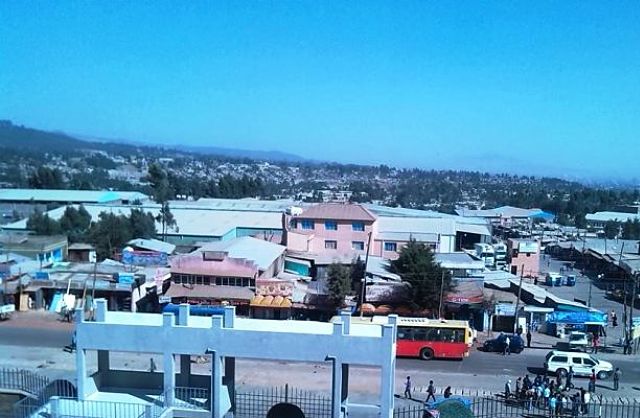 The town of Burayu, which is located on the outskirts of the capital Addis Ababa, was the scene of a recent ethnic-based violence that claimed several dozen lives and displaced thousands of people. (Photo: @fanatelevision)
The town of Burayu, which is located on the outskirts of the capital Addis Ababa, was the scene of a recent ethnic-based violence that claimed several dozen lives and displaced thousands of people. (Photo: @fanatelevision)
By ELIAS MESERET
ADDIS ABABA, Ethiopia (AP) — An Ethiopian security official has confirmed the arrests of hundreds of youths in the capital, Addis Ababa, following violence within the city and in nearby towns last week in which several dozen people were killed.
The announcement on Monday came following widespread calls on social media by citizens of the East African country to disclose the reason why the arrests were made.
“We arrested several people following the violence but most of them were released shortly after provided with advice. If we were to keep them all, our prisons wouldn’t be able to handle them,” said Degife Bedi, a police official with the Addis Ababa Police Commission. “28 people lost their lives in the violence in Addis Ababa alone. Most of them lost their lives after beatings with stones and sticks. Other seven people lost their lives due to actions taken by security forces.”
According to the official, more than 1,200 individuals who were “directly involved” in the violence in the capital have been sent to a military camp to be “rehabilitated” and 107 others will face criminal charges.
“An additional 2,000 people were detained inside hookah-serving houses, gambling shops and khat-chewing stores,” the police head said, adding that most were later released.
A week of violence erupted in Addis Ababa and its surrounding areas beginning from September 12 following disagreements between youths from the capital and its surrounding Oromia region over the use of different flags. On September 15, several people were killed in the Oromia region’s towns of Burayu and Ashewa Meda which victims blamed on youths from the same region.
City officials said 26 people lost their lives and close to 15,000 were displaced in the attacks in the capital’s outskirts but hospital sources told The Associated Press that at least 70 people were killed in the attacks that were mainly carried out on ethnic-lines.
Ethiopia’s new leader, Prime Minister Abiy Ahmed, hails from the Oromo ethnic group, Ethiopia’s largest. Various attacks based on ethnic rivalries are mushrooming across the country and are his biggest challenges to date.
Ethnic-based conflicts that are mainly driven by competition for land and resources are not new to Ethiopia, which is home to more than 80 ethnic groups, but the escalation of the current conflicts is alarming many. Some fear it may derail the reforms made by Abiy since he came to power in April.
—
Related:
Ethiopia’s Stunning Reforms Now Challenged by Deadly Unrest (AP)
Follow Africa news at https://twitter.com/AP—Africa
Join the conversation on Twitter and Facebook.

























